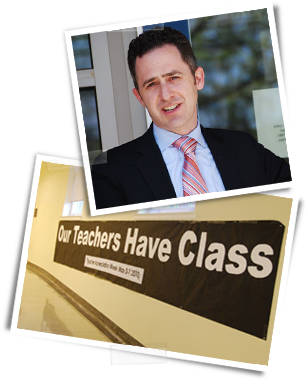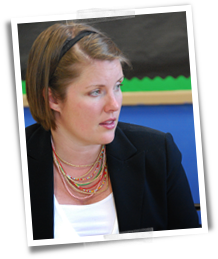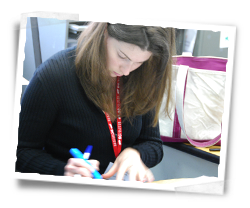


Advocates say poor children need the best teachers. But research shows schools with a majority of students from poor families are more likely to have inexperienced and ineffective teachers.

Children from poor families typically start school far behind their higher-income peers. Kids learn a lot from their families, in their early years before school and throughout their childhoods. Research shows that parents pass along all kinds of skills and knowledge, and parents who are better educated and have higher incomes tend to teach their children the kinds of language and social skills that help students do better in school. The achievement gap between poor kids and those from better-off families is firmly established by the time children get to kindergarten.
Great teaching can help narrow that achievement gap. Studies show having a high-quality teacher throughout elementary school can substantially offset, or even eliminate, the disadvantages of a low socio-economic background. As the level of teacher effectiveness increases, the lowest-achieving students are the first to benefit.
Tim Daly, president of the New Teacher Project, an organization that recruits teachers to poor schools, says providing the best teachers to poor children should be a matter of urgent national attention. "We don't just have an ineffective teacher problem," he says. "We have an effective teacher problem. Meaning, we have very effective teachers out there and they're teaching the wrong kids."
But Daly says not all teachers will succeed in poor schools. He says teachers of low-income students need an especially determined mindset because the students are often several grade levels behind and may not get help at home with schoolwork.
"[Teachers] who, after a few tries, will point to the kids and say 'they can't get it, it's them'" — those people will not succeed in poor schools, Daly says. The teachers who do succeed "always believe there is another way," he says. "And they have a huge confidence in the potential of all children to learn."
This belief — that all children can learn, regardless of background or circumstance — was actually written into the mission of the Washington, D.C. public schools a few years ago when a new chancellor arrived determined to improve the chronically failing school system. Nearly all students in the District's public schools come from poor families.
"If you walk into your classroom every day and you don't believe that [all kids] can achieve at high levels, then you just shouldn't be doing this work," says Jason Kamras, who oversees teacher policy for the District's schools. "Period, end of story."
Of course, having faith that kids can learn isn't enough to be an effective teacher. But Kamras and Daly say belief is a big problem in poor schools. They say many teachers just give up.
Daly says teachers who excel are often people with a record of beating the odds. "And it doesn't always mean they were promoted at every job they ever had more quickly than anyone else," he says. "Sometimes it's that they were willing to work two jobs while they went through community college to become the first person in their family that ever got a college degree."
Teachers in poor schools say persistence is key. Melanie Agnew once taught at a wealthy, suburban high school in Connecticut and now teaches at Coolidge Senior High School in Washington, D.C. Just 45 percent of the students at Coolidge are proficient in math, 48 percent in reading. The vast majority come from poor families. Agnew says persistence is a quality all teachers should have, but it's absolutely essential at a school like Coolidge. If teachers just throw up their hands, she says, they fail their students.
"Put your hands down," Agnew says about teachers, "and work at it."
But the attitude that some teachers bring to their classrooms, especially in the older grades, is the opposite of this "work at it" approach, says David Pinder, principal of McKinley Tech High School in Washington. "There are people who believe it's the job of the student to come motivated," he says.
Pinder says poor schools can't afford teachers with this attitude. "I think it's the job of the teacher to motivate kids, to make the learning relevant and connected so that they want to engage," he says.
This question of who is responsible for student learning runs deep in the debates about teachers, going back to 1966 and an influential government study known as the Coleman Report. The study was one of the first to cite evidence that family income and background have a huge impact on student achievement. The report led some people to conclude that schools can't really do much to make up for the achievement differences between poor children and their higher-income peers.
Questions about whether and how schools affect student achievement have been at the center of education policy debates ever since. The early research on the importance of teachers was a response to the notion that schools have no impact. Schools can have an impact, the research has established, when teachers in the schools are good.
Many young teachers working in poor schools now have clearly adopted the conviction that it's their job to make sure students do well.
"Ultimately, it's my responsibility to motivate the students, to provide the resources so that they can achieve at high standards," says Megan McKenna, who was hired by the New Teacher Project and now works as a special education teacher at public school in Washington. She says when her students fail, it's her fault.
McKenna's colleague Sherri Wallach agrees. "I fail everyday," she says matter-of-factly. "Whether it's because Brittany is sleeping in the back of the room or because Johnny failed his test, that's a failure on my part."
The responsibility many teachers feel for making sure their students succeed is admirable, says Susan Moore Johnson, a Harvard professor who studies teacher policy. But she questions whether putting so much responsibility on individual teachers is the best way to improve education for poor children.
"Staffing weak and dysfunctional schools with a steady stream of talented and motivated individuals may serve some students in the short run," Johnson wrote in a 2009 policy paper, "but it will not strengthen their schools in the long run."
Johnson says a good school is more than just a collection of good teachers. What's missing in debates about teacher policy, she says, is a discussion about what kinds of schools create good teachers - and good students.
"In study after study," Johnson writes, "researchers have concluded that schools do not become more effective unless teachers coordinate their work and contribute to school-wide improvement. But the benefits of such a coordinated effort are precluded by an approach… that depends primarily on the abilities and actions of individuals working within their solitary classrooms."
And Johnson worries that teachers in poor schools will burn out. About 40 percent of teachers leave the profession within five years of starting to teach. Turnover is higher in poor schools. Johnson says the research on teacher quality is generating important information about the significance of teachers. Ultimately, she says, America needs to create good schools where good teachers want to stay and work.
























